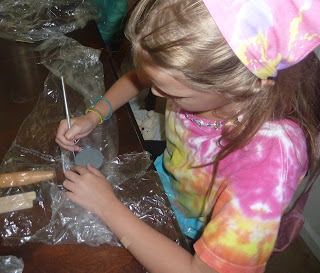I recently read Dr. Kevin Leman's Birth Order book. He talked quite a bit about perfectionism and he didn't seem to think it was a healthy thing. He mentioned an example of a child fixing his own bed. The mother walks in and says, "Oh, honey, you did a great job!" while she reaches to straighten out the wrinkles. Leman says this is a No, No. It creates perfectionist children who will grow up to carry that burden.
He also says that you want excellence instead of perfection. From his description I think that means that you do a job well enough for what it is meant for ~ it doesn't have to be perfect. For instance, the notes you take in class don't have to be perfectly formed letters with correct punctuation and sentence structure because they are for your eyes and brain only. But the resume you turn in for a job interview should look and read professional-like.
Charlotte Mason would say never to give a child a job that they can't execute perfectly and that children are capable of more than we think they are. I can see the wisdom of both sides. Maybe these "sides" aren't opposed to each other.
I've heard others use the term "best effort" referring to perfect letters or handiwork. So instead of perfect letters, you would look for a child's best effort. I usually look for correct formation of letters. They are sometimes squiggly or different heights, but I want the kids to be forming their letters the way they were taught. But then I see the near-perfect work that some kids do and wonder if I should be expecting more?
It's a struggle for me. I get stressed out if I feel I must have high perfectionist expectations and that can put a lot of pressure on the kids. I don't want a stressed out home school for us, so I'm trying to find some principles I can handle:
1 - The job should be within the child's ability. My 3 year old cannot form his letters. My 11 year old should be able to form all correctly and do it pretty dang well when required (such as for dictation). Handicrafts should also fall under this principle. (Although you should see some of our projects! They are far from perfect.) When you choose a craft too high for a child's ability, you end up doing a lot of the work. But......
2 - Sometimes a job takes practice even if the child is able. I'm not great at drawing. But I've been practicing during Nature Study, and my cicada this week was much better than my cricket last week.
3 - Work on one or two things at a time. For chores, our kids help with all household duties, but we are concentrating on teaching them how to clean the bathrooms. So their room may be a bit dusty from my lack of supervision, but those bathrooms are sparkling! We'll move onto laundry and rooms and such after bathrooms are conquered.
4 - Secure the ground under their feet. Show them what you expect out of copy work, crafts, habits, etc. Model it for them. Then watch and instruct as they do it. As they get it down, slowly back away and let them own it. Patience is key. And this instructing time will not last forever.
5 - We all tend toward laziness, right? Kids will get tired of doing the job the way you taught them and will start cutting corners. Call them back. Make them redo (not you) and keep an eye on them for a while until they are back to doing their best.
6 - Grace. God gives grace. We parents should give grace. God doesn't expect us to be perfect. He knows we won't be. That's why Jesus is our perfection. Our kids are little humans and will have bad days and get overwhelmed with our high expectations and will just want a break. Grace. Love. Hugs, snuggles, wisdom, and cookies.





















